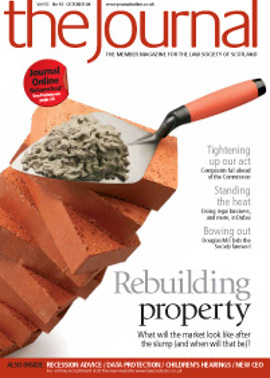Scottish Solicitors' Discipline Tribunal
Deryck De Maine Beaumont
A complaint was made by the Council of the Law Society of Scotland against Deryck De Maine Beaumont, solicitor, Balnaguard, Pitlochry (“the respondent”). The Tribunal found the respondent guilty of professional misconduct singly and in cumulo in respect of his repeated failure between 15 February 2005 and 4 April 2007 to reply to Faculty Services correspondence about counsel’s fees in respect of a client or to provide an explanation for the non-payment of said fees; his repeated failure between 16 June 2006 and 12 December 2006 to respond to the reasonable enquiries of the Society about fees due to Faculty Services in respect of the said client and failure to comply with notices served upon him; his repeated delay between 8 October 2002 and 4 April 2007 to reply to Faculty Services and failure to settle counsel’s fees for instruction in respect of cases concerning four clients; and his unreasonable delay between 24 August 2006 and 18 January 2007 in responding to the reasonable enquiries of the Society about the fees due to Faculty Services in respect of cases involving eight clients and his failure to comply with statutory notices served upon him.
The Tribunal censured the respondent, fined him in the sum of £2,500 and directed in terms of s 53(5) of the Solicitors (Scotland) Act 1980 that any practising certificate held or to be issued to the respondent shall be subject to such restriction as will limit him to acting as a qualified assistant to and to being supervised by such employer or successive employers as may be approved by the Council or the Practising Certificate Committee of the Council of the Society and that for an aggregate period of 10 years.
There is a long established practice that a solicitor has a professional responsibility with regard to settlement of counsel’s fees for work which he has instructed. A solicitor has a duty to comply with the Scheme for Accounting for and Recovery of Counsel’s fees of 1987 and 2002 between the Faculty of Advocates and the Society. In this case the respondent failed to provide a satisfactory explanation with regard to non-payment of counsel’s fees and failed to reply to letters and notices from the Society in connection with this matter. The Tribunal was very concerned to note the ongoing course of conduct by the respondent over a number of years in respect of failure to respond to the Society. He had also previously failed to respond to fellow solicitors and in this case he failed to respond to Faculty Services Ltd. The Tribunal noted that the respondent advised a previous Tribunal in September 2005 that he was now better at responding to matters and was more proactive. This was clearly not the case as the respondent was still failing to respond to the Society in August 2006. The Tribunal noted that the Tribunal on the last occasion had restricted the respondent’s practising certificate for a period of three years. The Tribunal also noted that the complaints against the respondent did not relate so much to the work carried out by him but more to his ability to properly run his practice and respond to queries raised. Given the number of previous findings against the respondent, the Tribunal considered that in addition to a restriction for 10 years, a fine of £2,500 should also be imposed. The Tribunal imposed an aggregate restriction to ensure that the respondent works under supervision for a period of 10 years before being able to apply for a full practising certificate.Edward Lindsay Acton
A complaint was made by the Council of the Law Society of Scotland against Edward Lindsay Acton, solicitor, 24 Shore Street, MacDuff (“the respondent”). The Tribunal found the respondent guilty of professional misconduct in respect of his failure between 13 September 2006 and 13 September 2007 to reply to the reasonable enquiries of the Society, his failure to provide any substantive explanation with regard to the complaint made about him to the Society and his failure to produce the file or comply with statutory notices served upon him. The Tribunal censured the respondent and fined him in the sum of £3,000.
The respondent did not lodge answers or attend the Tribunal. The Tribunal heard evidence from one witness and was satisfied that the respondent was guilty of professional misconduct. The respondent’s response was that as the complainer was not his client he could not provide the information which was confidential to his client. The Tribunal’s view was however that if a respondent has a valid reason why he could not produce the file and provide the information he should explain this to the Society. The Society as a professional body must be trusted to look at the file and take a view on whether or not there is confidential information in it which should not be transmitted to the complainer. The Tribunal noted that the respondent had two previous findings of misconduct against him, some for analogous matters. In the circumstances the Tribunal imposed a censure plus a fine of £3,000.
In this issue
- IHT: spouses and the nil rate band
- Taking up the message
- SGM: support for review process
- Rebuilding to order?
- Nipped in the bud?
- Hearing better
- Dubai: an ever-expanding market
- When is a discharge not a discharge?
- Out of the hot seat
- Site to behold
- Now for the real thing
- Navigating the perfect storm
- Data, personal data and statistics
- Caring about sharing
- Rainmaker - or cloud on the horizon?
- The limits of belief
- Process queries
- Scottish Solicitors' Discipline Tribunal (1)
- Scottish Solicitors' Discipline Tribunal (2)
- From agreement to obligation
- Ganging up on exploitation
- Scottish Solicitors' Discipline Tribunal
- Website review
- Book reviews
- Up for the big event
- Old lessons hold good
- The revolution starts here?
- CML Handbook: why the fuss?






